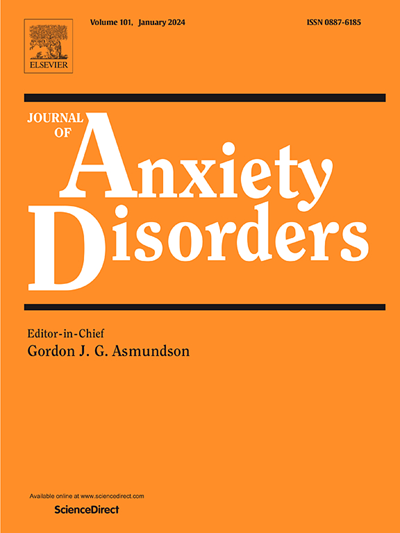Choosing certainty over risk: Associations of PTSD symptom severity with memory sampling during experiential decision making
IF 4.5
2区 医学
Q1 PSYCHIATRY
引用次数: 0
Abstract
The current study sought to examine whether lifetime PTSD symptom severity is associated with a bias toward sampling extreme negative events from memory when making decisions involving uncertainty. To this end, 40 trauma-exposed warzone veterans performed a decision task in which information about outcomes was learned through experience and making choices required sampling memories of past experiences. On each trial, participants made choices between certain and uncertain gains and between certain and uncertain losses. Uncertain outcomes were equally likely to yield a relatively positive or relatively negative outcome. After accounting for overall willingness to take risks, lifetime PTSD symptom severity was associated with less frequent choice of the uncertain option for gains and for losses, a pattern consistent with a memory sampling bias for all negative experiences rather than only extreme negative experiences. The overweighting of negative experiences as a function of lifetime PTSD symptom severity, however, was not observed in a subsequent explicit memory task in which participants estimated the frequency with which different outcomes had occurred during the decision task. These findings suggest that the memory mechanism responsible for the PTSD-associated memory bias in decision making is distinct from that mediating explicit memory performance.
选择确定性风险:经验决策过程中PTSD症状严重程度与记忆抽样的关联。
目前的研究试图检查终身PTSD症状的严重程度是否与在做不确定的决定时倾向于从记忆中抽样极端负面事件有关。为此,40名受过创伤的战区退伍军人执行了一项决策任务,在这项任务中,有关结果的信息是通过经验获得的,做出选择需要对过去的经验进行抽样记忆。在每次试验中,参与者都要在确定和不确定的收益以及确定和不确定的损失之间做出选择。不确定的结果同样可能产生相对积极或相对消极的结果。在考虑了整体的冒险意愿后,终生PTSD症状的严重程度与不确定的得失选择的频率相关,这种模式与所有负面经历的记忆抽样偏差一致,而不仅仅是极端的负面经历。然而,在随后的外显记忆任务中,并没有观察到负面经历作为终身创伤后应激障碍症状严重程度的功能的超重,在该任务中,参与者估计了决策任务中不同结果发生的频率。这些发现表明,导致ptsd相关的决策记忆偏差的记忆机制与调节外显记忆表现的记忆机制不同。
本文章由计算机程序翻译,如有差异,请以英文原文为准。
求助全文
约1分钟内获得全文
求助全文
来源期刊

Journal of Anxiety Disorders
Multiple-
CiteScore
16.60
自引率
2.90%
发文量
95
期刊介绍:
The Journal of Anxiety Disorders is an interdisciplinary journal that publishes research papers on all aspects of anxiety disorders for individuals of all age groups, including children, adolescents, adults, and the elderly. Manuscripts that focus on disorders previously classified as anxiety disorders such as obsessive-compulsive disorder and posttraumatic stress disorder, as well as the new category of illness anxiety disorder, are also within the scope of the journal. The research areas of focus include traditional, behavioral, cognitive, and biological assessment; diagnosis and classification; psychosocial and psychopharmacological treatment; genetics; epidemiology; and prevention. The journal welcomes theoretical and review articles that significantly contribute to current knowledge in the field. It is abstracted and indexed in various databases such as Elsevier, BIOBASE, PubMed/Medline, PsycINFO, BIOSIS Citation Index, BRS Data, Current Contents - Social & Behavioral Sciences, Pascal Francis, Scopus, and Google Scholar.
 求助内容:
求助内容: 应助结果提醒方式:
应助结果提醒方式:


